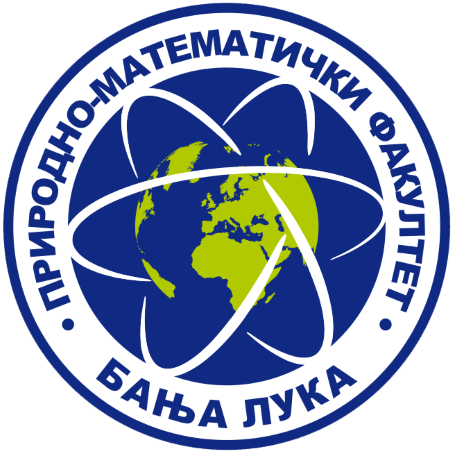Administrative Services
Administrative Services
 In addition to the educational-scientific and scientific-research units of the Faculty of Natural Sciences and Mathematics, the Faculty’s Statute establishes the existence of the Faculty Secretariat. The Secretariat is tasked with performing administrative-executive, legal, financial, material, general, auxiliary-technical, and other duties to fully achieve the goals of the Faculty. Within the Secretariat, three services are formed: Student Affairs Service, Financial and Material Affairs Service, and General and Legal Affairs Service. The Library, as an organizational unit, has a certain degree of autonomy but is also connected with the Faculty Secretariat.
In addition to the educational-scientific and scientific-research units of the Faculty of Natural Sciences and Mathematics, the Faculty’s Statute establishes the existence of the Faculty Secretariat. The Secretariat is tasked with performing administrative-executive, legal, financial, material, general, auxiliary-technical, and other duties to fully achieve the goals of the Faculty. Within the Secretariat, three services are formed: Student Affairs Service, Financial and Material Affairs Service, and General and Legal Affairs Service. The Library, as an organizational unit, has a certain degree of autonomy but is also connected with the Faculty Secretariat.
The Secretary of the Faculty oversees the activities of the Secretariat. Branka Trninić (branka.trninic@pmf.unibl.org) holds the position of Faculty Secretary. More about administrative services can be found here.
 Faculty members represent the foundation of our academic excellence.
Faculty members represent the foundation of our academic excellence.
 Our academic community is organized through study programs. The Study Program Council consists of teachers and collaborators employed in that study program. The Study Program Council is responsible for shaping the curriculum, proposing decisions on the engagement of teachers and collaborators, and providing guidelines for quality academic practice. Through collaboration and dialogue, council members contribute to the continuous improvement and adaptation of the program to meet the challenges of modern science and the needs of the job market. Generally, decisions made by the Study Program Council are forwarded to the Scientific and Teaching Council for further adoption procedures.
Our academic community is organized through study programs. The Study Program Council consists of teachers and collaborators employed in that study program. The Study Program Council is responsible for shaping the curriculum, proposing decisions on the engagement of teachers and collaborators, and providing guidelines for quality academic practice. Through collaboration and dialogue, council members contribute to the continuous improvement and adaptation of the program to meet the challenges of modern science and the needs of the job market. Generally, decisions made by the Study Program Council are forwarded to the Scientific and Teaching Council for further adoption procedures. The Faculty of Natural Sciences and Mathematics was established by the decision of the National Assembly of the Republic of Srpska on September 12, 1996. FNSM emerged as a separation of a group of natural sciences from the Faculty of Philosophy, with its origins in the Pedagogical Academy and the Higher Pedagogical School founded in Banja Luka in 1950, where basic groups of natural and social sciences existed.
The Faculty of Natural Sciences and Mathematics was established by the decision of the National Assembly of the Republic of Srpska on September 12, 1996. FNSM emerged as a separation of a group of natural sciences from the Faculty of Philosophy, with its origins in the Pedagogical Academy and the Higher Pedagogical School founded in Banja Luka in 1950, where basic groups of natural and social sciences existed. The Faculty of Natural Sciences and Mathematics in Banja Luka is one of the institutions covering the fields of natural, mathematical, and computer sciences in the Republic of Srpska. The study programs at the Faculty enable the realization of educational and scientific research work, contributing to the development of knowledge in the field of natural sciences and the application of research results in teaching and practice.
The Faculty of Natural Sciences and Mathematics in Banja Luka is one of the institutions covering the fields of natural, mathematical, and computer sciences in the Republic of Srpska. The study programs at the Faculty enable the realization of educational and scientific research work, contributing to the development of knowledge in the field of natural sciences and the application of research results in teaching and practice. Student mobility represents a crucial component of the modern education system, offering students a unique opportunity to gain valuable experiences beyond their home institution. Student mobility encourages diversity, enhances language skills, fosters mutual understanding, and promotes interculturality. Additionally, internships and practical training abroad provide students with the chance to apply their theoretical knowledge in the real world, acquiring practical skills and expanding their professional network.
Student mobility represents a crucial component of the modern education system, offering students a unique opportunity to gain valuable experiences beyond their home institution. Student mobility encourages diversity, enhances language skills, fosters mutual understanding, and promotes interculturality. Additionally, internships and practical training abroad provide students with the chance to apply their theoretical knowledge in the real world, acquiring practical skills and expanding their professional network. The Faculty of Natural Sciences and Mathematics (FNSM) is dedicated to bringing the fascinating world of science to all generations, with a special emphasis on the youngest. This commitment aims to stimulate curiosity and discover the wonders of nature and mathematics in an accessible and exciting way.
The Faculty of Natural Sciences and Mathematics (FNSM) is dedicated to bringing the fascinating world of science to all generations, with a special emphasis on the youngest. This commitment aims to stimulate curiosity and discover the wonders of nature and mathematics in an accessible and exciting way. Publishing activities at the Faculty of Natural Sciences and Mathematics (FNSM) play a crucial role in disseminating scientific knowledge and supporting education. FNSM publishes professional publications and textbooks, providing students, researchers, and the general public with access to relevant information. In this way, it not only enriches knowledge in the fields of natural, mathematical, and computer sciences but also supports the faculty’s mission to share research achievements and promote further scientific growth.
Publishing activities at the Faculty of Natural Sciences and Mathematics (FNSM) play a crucial role in disseminating scientific knowledge and supporting education. FNSM publishes professional publications and textbooks, providing students, researchers, and the general public with access to relevant information. In this way, it not only enriches knowledge in the fields of natural, mathematical, and computer sciences but also supports the faculty’s mission to share research achievements and promote further scientific growth. A large number of scientific conferences, symposiums, student conferences, and similar events have been organized by the Faculty of Natural Sciences and Mathematics. In addition to raising the level of scientific work at the Faculty, these activities contribute to the exchange of ideas and the establishment of collaboration with similar related institutions, making a significant contribution to the development of scientific research in the wider community. Furthermore, scientific conferences provide an excellent opportunity to introduce young researchers to scientific work and connect with leading scientists in the field. Among the conferences and events organized by FNSM, the following can be highlighted:
A large number of scientific conferences, symposiums, student conferences, and similar events have been organized by the Faculty of Natural Sciences and Mathematics. In addition to raising the level of scientific work at the Faculty, these activities contribute to the exchange of ideas and the establishment of collaboration with similar related institutions, making a significant contribution to the development of scientific research in the wider community. Furthermore, scientific conferences provide an excellent opportunity to introduce young researchers to scientific work and connect with leading scientists in the field. Among the conferences and events organized by FNSM, the following can be highlighted: